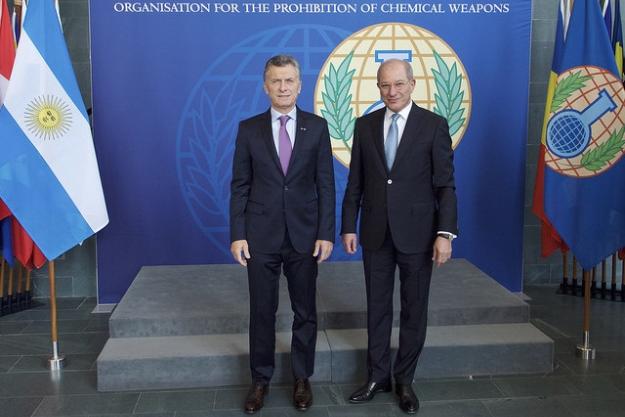
The President of the Argentine Republic, H.E. Mr Mauricio Macri (left), and OPCW Director-General, Ambassador Ahmet Üzümcü. The President of the Argentine Republic, H.E. Mr Mauricio Macri (left), and OPCW Director-General, Ambassador Ahmet Üzümcü, unveil a plaque commemorating the visit to OPCW Headquarters.
THE HAGUE, Netherlands — 28 March 2017 — The President of the Argentine Republic, H.E. Mr Mauricio Macri, visited today the Headquarters of the Organisation for the Prohibition of Chemical Weapons (OPCW) in The Hague.
President Macri met with the Director-General of the OPCW, Ambassador Ahmet Üzümcü, Chairperson of the Conference of the States Parties, H.E. Dr Christoph Israng; Chairperson of the Executive Council, H.E. Mrs Odette Melono; and senior officials of OPCW Technical Secretariat.
The President was accompanied by Governor of the Province of Entre Ríos, Mr Gustavo Bordet; Minister of Foreign Affairs and Worship, Ms Susana Malcorra; Secretary of Strategic Affairs, Mr Fulvio Pompeo; Secretary of Human Rights and Cultural Pluralism, Mr Claudio Avruj; Ambassador of the Argentine Republic to the Kingdom of the Netherlands and Permanent Representative to the OPCW, Mr Horacio Salvador; and Members of Parliament, Mr Lucas Incicco and Mr Luis Petri.
The Director-General briefed the President on the achievements in the implementation of the Chemical Weapons Convention, including OPCW’s activities in the Syrian Arab Republic, and highlighted the continued relevance of the OPCW in an evolving security environment.
During the visit, President Mauricio Macri reaffirmed Argentina’s firm commitment to disarmament and non-proliferation and acknowledged the key role of the OPCW in that goal, as it was widely recognised in 2013 when the Organisation was awarded the Nobel Peace Prize. In the midst of challenging times and emerging threats, President Macri highlighted OPCW’s evolution to stay relevant.
Argentina’s President renewed his pledge to continue supporting OPCW’s activities by enhancing the capacities of the Member States in line with the provisions of the Convention, hosting many regional training courses, and contributing Argentine experts to the organs of the Organisation. The President praised the Director-General and his staff for their commitment and professionalism, and the many initiatives to prevent the re-emergence of chemical weapons, especially in the field of education and outreach.
“I am grateful for the dedicated support of the Argentine Republic to the OPCW. Today, we have reiterated our shared commitment to the elimination of all chemical weapons, and sustained vigilance to prevent their re-emergence,” stated Ambassador Üzümcü.
Following the meeting, President Macri and Director-General Üzümcü unveiled a plaque commemorating the visit to the OPCW Headquarters.
Background
The Argentine Republic is one of the early signatories of the Chemical Weapons Convention (CWC), having joined the treaty in 1997.
Argentina actively supports CWC’s implementation at international and regional levels, including providing expertise and resources in relation to a number of key pillars of the CWC regime, including capacity building, education and outreach, assistance and protection.
Since 1997, Argentina has been consecutively elected to the OPCW Executive Council. Experts from Argentina have been making valuable contributions to key OPCW subsidiary bodies, including the Scientific Advisory Board and the Advisory Board for Education and Outreach.
Argentina’s contribution to strengthening the global WMD non-proliferation norms is also evidenced by its active engagement in international and regional arms control and disarmament treaties.
As the implementing body for the Chemical Weapons Convention, the OPCW oversees the global endeavour to permanently and verifiably eliminate chemical weapons. Since the Convention’s entry into force in 1997 – and with its 192 States Parties – it is the most successful disarmament treaty eliminating an entire class of weapons of mass destruction.
To date, nearly 95 per cent of all chemical weapon stockpiles declared by possessor States have been destroyed under OPCW verification. For its extensive efforts in eliminating chemical weapons, the OPCW received the 2013 Nobel Prize for Peace.
More Information
